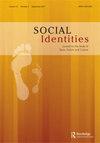A conceptual analysis of the Rohingya–host community conflict over scarce resources in Bangladesh
IF 0.7
Q3 ETHNIC STUDIES
引用次数: 2
Abstract
ABSTRACT Bangladesh hosts over a million Rohingya on humanitarian grounds and offers them food and shelter. The Rohingya compete with the local community for access to economic and environmental resources and public services. I analyse this competition and conflict using conflict theory, which is a sociological perspective on social conflict. I argue that while the Rohingya are unquestionably marginalized, so is the local community, who are citizens and have the right to life and livelihood. I find that the presence of the Rohingya constrains the poor local community’s already limited access and that leads to conflicts on various issues such as access to inadequate public services, local and economic activities such as labour markets and environmental resources, and there is an emerging problem of safety and security that they are facing. We can understand this as a type of resource conflict which emerges within the south-south forced migration, statelessness, and refugee-hood context between the citizens and the refugees, as countries in the Global South, such as Bangladesh, generally lack the resources and capacity to govern people.对孟加拉国罗兴亚收容社区因稀缺资源而发生冲突的概念分析
摘要孟加拉国以人道主义为由收容了100多万罗兴亚人,并为他们提供食物和住所。罗兴亚人与当地社区争夺经济、环境资源和公共服务。我使用冲突理论来分析这种竞争和冲突,这是一种关于社会冲突的社会学视角。我认为,尽管罗兴亚人无疑被边缘化了,但当地社区也是如此,他们是公民,有权获得生命和生计。我发现,罗兴亚人的存在限制了当地贫困社区本已有限的准入,这导致了在各种问题上的冲突,如获得不足的公共服务、劳动力市场和环境资源等地方和经济活动,以及他们面临的新出现的安全保障问题。我们可以将其理解为一种资源冲突,它出现在公民和难民之间的南南强迫移民、无国籍状态和难民身份背景下,因为孟加拉国等全球南方国家普遍缺乏治理人民的资源和能力。
本文章由计算机程序翻译,如有差异,请以英文原文为准。
求助全文
约1分钟内获得全文
求助全文
来源期刊

Social Identities
ETHNIC STUDIES-
CiteScore
2.00
自引率
0.00%
发文量
22
期刊介绍:
Recent years have witnessed considerable worldwide changes concerning social identities such as race, nation and ethnicity, as well as the emergence of new forms of racism and nationalism as discriminatory exclusions. Social Identities aims to furnish an interdisciplinary and international focal point for theorizing issues at the interface of social identities. The journal is especially concerned to address these issues in the context of the transforming political economies and cultures of postmodern and postcolonial conditions. Social Identities is intended as a forum for contesting ideas and debates concerning the formations of, and transformations in, socially significant identities, their attendant forms of material exclusion and power.
 求助内容:
求助内容: 应助结果提醒方式:
应助结果提醒方式:


